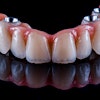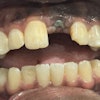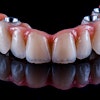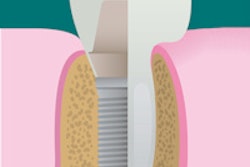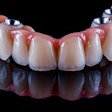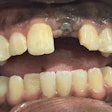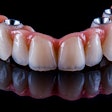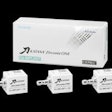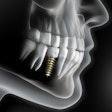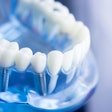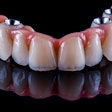A recent article in the Journal of Oral Implantology looks at long-term treatment for a patient with severe periodontal damage (December 2013, Vol. 39:6, pp. 737-742).
In the article, the authors anticipate that the higher risk of implant failure in this patient will be offset by coating the implants with a rough, oxidized surface called TiUnite and emphasizing the need for diligent oral hygiene. They also expect that by using overdenture prostheses instead of conventional removable dentures, they will improve stability and function -- and thus patient satisfaction.
Should a person's teeth be saved at all costs? Over the last decade, the answer has shifted in the minds of some clinicians from yes to no in favor of replacing diseased and damaged teeth with implants. In particular, treatment of patients with periodontitis and inflammatory disease of ligaments and bones supporting teeth remains controversial because artificial tooth roots are more likely to fail.
Many implants are placed without complications. However, pressure on implants is suspected to speed up loss of dense cortical bone in the jaw.
The current article is a case report on a 51-year-old patient who had been in a motorcycle accident and has a history of herpes, hepatitis, insulin-dependent diabetes, and persistent recurrent tooth decay. The patient's remaining teeth were comprised of fractured crowns and older failing implants. The surgeons removed all of his teeth and old implants followed by the immediate insertions of new implants and stabilizing overdentures. Provisional implants were used for support during healing. Five months later, the interim provisional implants and prosthesis were removed and fabrication of a final restorative prosthesis was initiated.
Despite the higher risk of implant failure because of his periodontal disease and diabetes, the patient's implants have been in place for 12 years with no complications noted at routine checkups and cleanings. The patient has been instructed postsurgery in proper use of floss threaders, deep-cleaning brushes, and an oral irrigator. His daily efforts to practice good oral hygiene improved his overall dental health.
In this case, the prostheses have been effective, predictable, and reliable, the authors concluded. They contend that such positive results were only possible because the patient changed his home oral care, preventing plaque buildup and disease.
